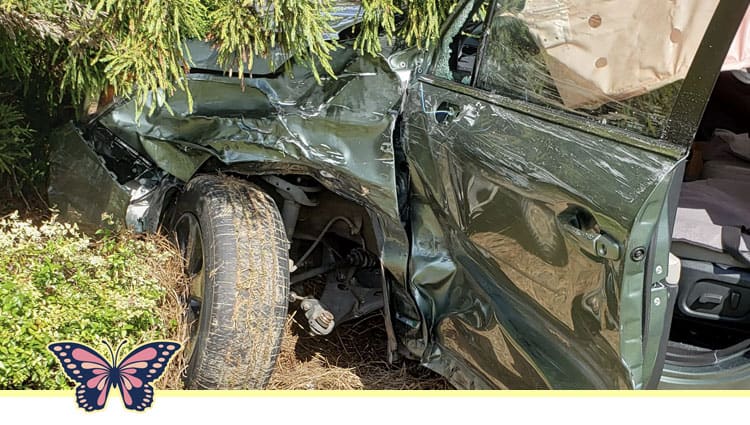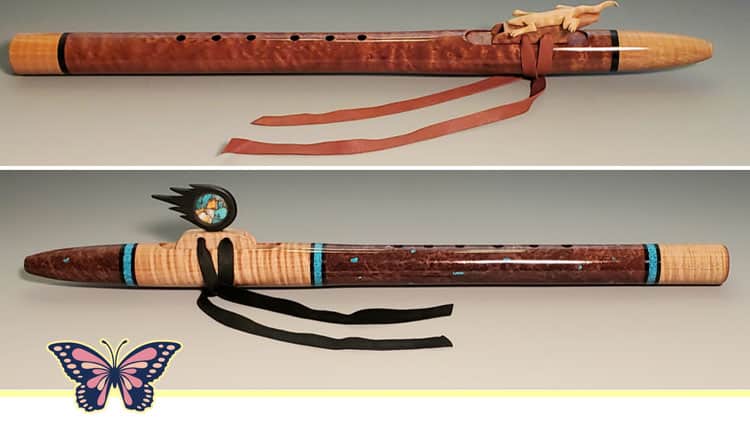
A story, a car crash that ends with the gift of “Living in the Present.”
This story begins with a car crash I wished had happened long ago. It’s a story that needs to be written, perhaps for no other reason than to remind me about living in the “Living in the Present.” It’s a place I never knew, and it’s a place I am getting to know. Allow me to share it with you.
Wreck Leads to How to Live in the Present
Table of Contents
- The Story Begins with a Wreck
- Think of Your Brain as A Muscle
- The Gift of Living in the Present
- Living in the Present
- Living in the Present…Adult Coloring
- Living the Present…Native American Flute
- Living in the Present…Leaving A High-Demand Religion
Other resources. Check out other supporting resources on ColoringButterfly.com that you might enjoy.
- How Adult Coloring Helps My Traumatic Brain Injury (TBI Recovery)
- Buying A Coloring Book: Everything You Need to Know (Guide)
- Buying Colored Pencils? Everything You Need Know (Guide)
Table of Contents
ToggleThe Story Begins with a Wreck
Within the last few years, I experienced a severe auto accident where I incurred a traumatic brain injury (TBI). The TBI was one of the most significant experiences in my life. Yes, the accident changed my life physically, mentally, and emotionally but it gave me much more. I saw myself and my world in a new light. I permitted myself to be in the “Living in the Present”, a place I have never known. This is my story about the early days of my recovery, which is still in process. [TOC]
4:48 p.m.

It was Thursday; I was on to my daily 5 p.m. Cross Fit. As I approached the roundabout, the traffic in the oncoming backed up on the two-lane country road. Suddenly without warning, at 4:48 p.m., a white service van entered my lane. My first thought was, “Oh no, this is not good.”
I veered to the right and was hit at a 45-degree angle as I drove off the road and hit a tree. Airbags deployed. The next thing I remember is the voice from Starlink, “We notice your airbags have deployed, and do you want us to call for help?”
I responded, “That might be a good idea.”
Once police arrived, the accident seemed to be processed efficiently and orderly. The ambulance arrived, police interviewed me, and emergency services shook the hand of the driver who hit me, took a picture or two of my bent-up car, took a ride to the ambulance to the hospital, and asked the police officer to call my wife. Yeah, that was how I spent my evening.
Within a few hours accident happened, and a traditional Author kicked in. I thought about my professional career, projects, deadlines, people who depended on me, and the meetings I had scheduled. I remember the trips I had planned with my wife for the next two months, hotel and flight reservations. I showed up on time for my first meeting on Friday at the 8:30 zoom meeting. While waiting for the other to arrive, I shared that I had been in an accident and showed some pictures I had taken. My manager encouraged me to take the rest of the day off, which I did.
Saturday morning, my world changed. I woke up, and everything was very, very slow. As I rose from the bed, I felt severe pressure in my head. As I stood, I stumbled. When I spoke, my speech was slow and slurred. I could not readily find the words to express myself. I was scared, really scared. What was happening to me? That was the moment my “long, long road” began. [TOC]
First Meeting with Primary Care Physician
Within two days of the accident, I made an appointment to see my primary care physician (PCP), where she performed a set of tests and discussed my symptoms and history. This was the beginning of my journey, including hundred-pus appointments with an array of medical specialists (e.g., neurology, physiatry, physical therapy, and many more).
The first meeting lasted almost an hour with my PCP. Unlike most PCPs, my physician had an in-depth understanding of TBI, and she just happened to be married to a neurologist.
During our discussion, she confirmed that I had had a traumatic brain injury (TBI). She then excused herself and said she wanted to discuss the case with her husband, a neurologist who worked for a different hospital system. Upon her return, she recommended referring me to a neurologist in our medical plan and a group of physical therapists helping patients with TBI. [TOC]
Every TBI Is Different
My next thought and question was, “Okay, great, doctor. Can you tell me how long this TBI is going to last? And what the next steps are?”
She smiled and responded, “It’s going to take time. Every TBI is different.”
Over the next half hour, she explained that a TBI could last a couple of weeks, and others can last for years. The older you are and the number of TBIs you have had in the past can also affect you. A traumatic brain injury (TBI) changes how your brain works, such as how you think, act, move and feel. The heal will heal in its own time. There are things you can do to help move the healing along. However, you will need to allow this injury to play itself out.
After leaving the doctor’s office, I was determined to put this TBI behind me as quickly as possible. Between work, family and service obligations, I had too much to do to be sidelined for too long. I had mentally concluded that the 90 days my Dr had advised was just too much time. I concluded this TBI was no more than a superficial sports injury, and I would be out no more than 30 days. [TOC]
Researching TBI Symptoms
Before the meeting with the PCP, I had no idea about TBIs. As soon as I arrived home, I began researching TBI and its effects, and I was experiencing every one of these symptoms.
A common symptom of TBI is slowed thinking. Following a TBI, you can have trouble remembering, getting and staying organized, or even knowing the right words to use when speaking. These are the cognitive functions of the brain. In addition, symptoms like anger, stress, or even trouble sleeping can affect brain processing.
These changes in the brain can affect how the brain takes in and stores information. This can cause your thinking processes to be slower and make it harder to stay focused. For example,
You might lose some memory. After a TBI, your brain could have trouble storing and finding memories. The most common is short-term memory loss. Short-term memories are memories that happened 30 minutes ago. For example, you are at the store and forget what you want to buy.
You may have difficulty becoming organized. Many patients with TBI mention that they have issues with being able to do more than a few things at once. For example, you may be watching TV and forget about the food that is cooking on the stove. You might start a project or make plans but have difficulty following through.
You are lost in finding the right words to use. Everybody has had the experience of having the word “tip of the tongue” but not being able to remember it. After a TBI, this type of problem can become more frequent. You can struggle to find words you want to use or use the wrong words instead. [TOC]
Think of Your Brain as A Muscle
On the first day, I would meet with the physical therapist team; I went through a series of tests over two hours to help understand the problems I was having and to measure their severity. TBI recovery specialists are trained to look for and train cognitive problems. At the end of the two hours together, we developed a plan that started. Of course, I wanted to jump into a program, work hard and heal quickly.
The lead physical therapist put me in my place very quickly. She made it clear that it was going to take time. She shared almost word for word what my primary care physician had told me about TBI.
She stressed, “Think of your brain as a muscle. You will find out over time that there are layers of injury in a TBI. When you think you have made progress in one area, a new level of difficulty will cause a rise that needs to be mastered. In essence, we are helping your brain recover, remap and help itself heal. The brain is in charge, and we have the power to help it, but only so far and so fast.”
She continued, “You can help your brain improve by exercising it and keeping it active. Practice memorizing things, or work on crossword puzzles. A memory specialist can teach you different ways to improve your memory.”
Again she emphasized, “The injury will take its own time to heal.” [TOC]
From “This Is Hokey” to Starting New
As the weeks passed in physical therapy, I was introduced to many new skills that seemed rather hoky. My pride did not allow me to accept that my life had changed. I needed and wanted to get back to work. Ultimately, I need every one of these simple changes to make the days, weeks, and months.
For example
As the weeks passed in physical therapy and medical consultations, I was introduced to many new skills that seemed rather hokey at the time. My pride did not allow me to accept that my life had changed. In the end, I need every one of these simple changes
- Place items in one place. To prevent the loss of your keys, wallet, or important papers, have one place at home where you keep them.
- Write things down. Make lists of tasks you need to remember when those things are still fresh in your mind. Keep a to-do list and fill in a daily planner for the days ahead.
- Break down chores into pieces. Break down your chores each day into manageable pieces. Do one thing at a time and then move on to the next.
- When you are lost for words, talk worldwide by using other similar words if you struggle to find the right word. You can sometimes find the word you want by going through the alphabet for the correct first letter.
- Go to bed and get up at the same time every day. Being tired during the day makes cognition worse. Don’t try to do too much when you’re tired.
- Stay away from stressful situations and strong emotions. Learn ways to reduce stress. Try exercise, deep breathing, massage, listening to music, or doing an activity or hobby you enjoy.
- Little did I realize that my journey had only just begun. I am still working hard to overcome the effects of the accident. Every day is different, and every day is a gift to life. I have learned to be grateful and humbled by the great opportunities to surrender my pride and learn to live in the now and cherish the moment. Not to worry about the past or what is to come because the moments will take care of themselves. I would like to change directions and share a few areas where the TBI has been a changing influence in my life. [TOC]
The Gift of Living in the Present
Where do I begin? If you were to ask me how this accident changed my life, I would share that it has been an evolution.
Doctor Appointments and Miles to Travel
f you were to ask how the accident has changed my life, I would share that the change is ongoing. At first, I treated the accident like I did everything else in daily life: Define the goal, set the deadline, outline the steps of the goal, and get it done. My goal was to return to work in a few days, and a few days became a week, two weeks, a month, and then six months.
A doctor’s appointment became medical tests, physical therapy for brain injuries, more tests, more doctors, speech therapy, occupational therapy, more physical therapy, hundreds of miles, hundreds of hours at home doing the exercises for brain injuries. I was doing everything I could to be in charge and force results. However, recovery was slow and frustrating. [TOC]
Then One Morning, the Answer Came
Every morning, for the first three months, I would look in the mirror and, with a cheerful voice and stern look, say, “Author, You got this. Today, you will win and be better.” Then one morning, I looked in the mirror and began to cry. No, I didn’t have this. I was not in control. I asked myself, “Well, big guy, where do we go from here? Tell me. I’m listening.”
where do we go from here? Tell me. I’m listening.”
I received an answer. An inner self spoke in a very gentle but audible voice. “This journey of recovery will be between you and me.” Surprised by the answer, I retired to the bedroom, sat in a recliner next to the bed, and proceeded to carry on a conversation with the inner me. I asked questions and listened. The answers came freely. I was saddened by the revelations shared by my inner self. The inner self exposed how I had abused my body and health with my relentless drive to achieve, endless work hours, pressing forward without rest, and so much more.
With a deep, pleading heart, I asked, “where do I begin to change?”
A few minutes later, my answer came. “Start by Living in the Present. Just Live in the Present”
Surprised, I questioned, “Living in the present, meaning what exactly?”
The thought expanded, “Yesterday is past, and tomorrow will come. And Today only comes once, and that is now. Don’t let it pass you by.” [TOC]
Living in the Present
In the days and weeks that followed, I learned about “Living in the Present.” I was not in charge of my healing. Instead, I was part of a team. The team included my brain, my inner self, my medical team, and me. Between all of our efforts, we would work together to give my brain a chance to rewire and become the best brain it could become. Will my brain return to what it was? Could I return to being 100%? Only time will tell. The rest of this story is a very brief inside look at how the TBI has changed my life for the better.
“Living in the Present” is not about forgetting the future; instead, it is about recognizing and cherishing the moment you live in. As a young father, I often remember that I might be playing with my son on the floor with building blocks while thinking about the next day’s meeting; at that moment, I am not fully present for him.
Allow me to share three essential examples of the insightful and life-changing TBI and inner self for giving the gift of “Living in the Present.” [TOC]
Living in the Present…Adult Coloring

I have hundreds of hours in rehab, working with my medical team and working to create a new life and find some normalcy. Throughout my physical therapy, I have been exposed to different levels of exercises designed to help the body and brain rewire. Exercises have ranged from standing on one foot to working on balance to trying simple Sudoku puzzles. They were all challenging.
During one physical therapy session, I was given a simple coloring book and coloring pencils and asked to color for 25 minutes. I initially felt silly, a grown male adult coloring, and I asked the therapist what good it would do. She responded that it was an excellent exercise for the brain to think and excise. After only 15 minutes, I was mentally exhausted. She encouraged me to do more coloring at home. I went home and ordered a cheap set of 72 colored pencils and a mandala coloring book and began to color.
In coloring, I can choose to color a scene in the jungle one day, a castle with a dragon, or a sunflower another day. I choose the colors. As my skills improved, I graduated with quality colored pencils, coloring books, and coloring accessories. I am learning everything I can about coloring, shading, blending colors, coloring books, papers, and much more. It is so fun and satisfying. There is no rush or timeline.
There have been times when I leave a coloring book open on the table, and I will ponder for a day or two about what color would like to color the flower. When I make the decision, I spend ten minutes and then ponder the next decision. I live in the now. The joy of coloring. Before the accident, I would never have allowed myself the pleasure of coloring. I will share more about my coloring experience in this article, “How Adult Coloring Helps My Traumatic Brain Injury (TBI Recovery).” [TOC]
Living the Present…Native American Flute

The next time you open your iPhone or Android or walk past Alexa, make a query/request to listen to Native American Flute (NAF) music. Just stop for five minutes and listen to this instrument’s mellow, deep beautiful sounds. I had barely started playing the NAF before the accident but was an off-and-on player because of other priorities. I always had other priorities at work to meet my imposed deadlines.
One day during a discussion with my physical therapist, I shared that I wanted to learn to play the NAF. Immediately she said that the NAF would be a perfect exercise for my brain to rewire. That was all I needed, and I wasn’t working anyway because I was off on extended leave from work. I went home the very day and worked out a plan to start playing. I fell instantly in love. The NAF was easy to learn. The music was so delightful, so beautiful, and so relaxing. I was carried away as I held the NAF in my hands. In time, I was able to play the music that was in my soul. The following is an example of living i the moment. Jonny Lipford is one of my favorite players.
One of my most cherished moments was when I took a hike in the nearby woods. I took my flute with me. I stopped to sit on a log and played a song from my heart. As I played the first note, I heard the sound of a bird’s reply. Again I played the same note, and again, the bird replied. This exchange carried on for 10 minutes. I so loved living in that now moment.
If you would like to just listen to the soothing sounds of the Native American Flute, do a Google search on “native American flute music” or say to Amazon Alexa, “Alexa, play Native American Flute Music.”
Now I own ten flutes of music keys, and I continue to add different keys to my collection. Every flute has a soul that has the right to be heard. I am so lucky to be the one who gets to share that moment and fill the air with its sound. Without the accident, I would never, if ever, have found this joy. [TOC]
Living in the Present…Leaving A High-Demand Religion

The following example has many facets I won’t take the time to explore. I will focus primarily on the final, perhaps hardest decision of my life, “to leave.” For most of my life, I was a “Mormon” belonging to the Church of Jesus Christ of Latter-day Saints. I was a “True Blue Mormon, All In.” I believed the core doctrine, which was that Joseph Smith, the founder, was a true prophet, the church was God’s only true church on the earth, we had a prophet who spoke for God Today, and Jesus Christ was at the head of the church, and that every other church was false. I had completed the church’s essential requirements for eternal exaltation, from baptism to temple marriage. I had worked for my eternal glory, and I never did enough. I had to keep repenting, keep doing, keep on, keep on.[TOC]
I Felt Betrayed
Then one day, I started reading what was referred to as the Gospel Topic Essays. Essentially, they are the church’s explanation of some core doctrines. Wow. I learned a lot of exciting and new pieces of information and doctrine that I had never been told before. I felt that the church had been lying to me all my life. Flat-out lying to me. All that was once beautiful was now gone. That started me down a path of seeking to understand more whether what I had read was true. I wanted it to be wrong, and I wanted it to be a misprint.
all my life. Flat-out lying to me. All that was once beautiful was now gone. That started me down a path of seeking to understand more whether what I had read was true. I wanted it to be wrong, and I wanted it to be a misprint.
As time when on, I felt betrayed. I had given my life all my life to the church. I had served an average of 15 to 20 hours a week in church callings, paid 10% of my income, taught my children to live its teachings, served a two-year mission, and studied and lived its doctrine. Now, I found out it was nothing more than a lie.
For three years, I earnestly studied, hoping to find just one piece of information that was not a lie, just one reason to stay. I pleaded with God in prayer. Please, God, tell me it’s true; show me where to find the answers I seek. I read everything I could get my hands on from the church. I read every footnote from church publications; I listened to every church talk I could get my hands on. I needed to know. This was about my salvation, my eternal salvation.[TOC]
Accident, Meditation, Direction
Then I had an accident. It was in April of the year. Five months after the accident and two months after my first interaction with my inner self.
In my weekly meditation with my inner self, I shared how I was restless and concerned about how I felt about the church. I told my inner self how I felt I had strayed too far from the church. I needed and wanted to return to God’s good graces and become one with Christ as I once was. Yes, that is what I needed to do. Forget all that I learned. Just go back to believing. Just be a good Mormon.
I was silent. After a few minutes, the words Jack Kornfield came to mind: a work colleague’s recommendation. A few days earlier, I downloaded an Audible book by Jack entitled “The Wise Heart.” I felt I needed to listen to the book. The book filled many gaps in my quest to understand and cherish Today. As I listened to the book, my inner self continued to repeat the words “Living in the Present.”[TOC]
A Lie Is A Lie
Two weeks later, after listening to the book, I sat silently with my inner self; shared, “My heart still aches for resolution. I need peace with my spiritual health and being. Can I ever go back to being just a good Mormon boy?”
The response of my inner self was quick and gentle, “Author, a lie can never be the truth, and a liar that refuses to correct a lie remains a liar. As long as you support the lie, you will be part of the lie as well. Turn around and just walk away.”[TOC]
Just Walk Away
Oh, My Goodness!!! Was it that simple? Just turn around and just walk away. “Okay, I replied, I need a few days to ponder this.” The more I thought, the more straightforward it became. The words kept returning over and over. “Just walk away,” “Just walk away,” “Just walk away,” “Just walk away.”
I don’t remember the exact day. But I felt a change inside. A profound, extraordinary change. The fear of losing my eternal salvation was gone. GONE. GONE. GONE. Any value the Mormon church had in my life was gone. It had just gone away. It no longer had any hold on me. I felt joy unlike any I had felt in such a long time.
I stopped and thought aloud, speaking to my inner self, thank you for this blessing. The response came, “Live in the Present, and it will never come again.”
I have shared enough if you have stayed with me this long. Thank you. Live in the Present. This moment will never come again. [TOC]
If you liked this article please, share it with others.
Portions of this article are sourced to:
Traumatic Brain Injury (Mayo Clinic)






